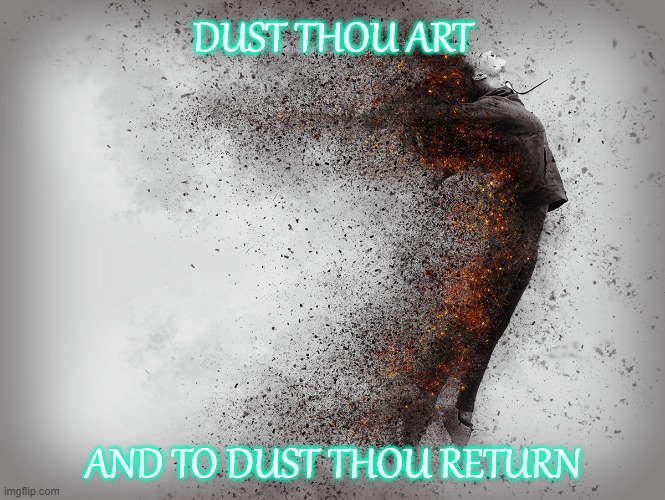

13 Like as a father pitieth his children, so the LORD pitieth them that fear him. 12 As far as the east is from the west, so far hath he removed our transgressions from us. 11 For as the heaven is high above the earth, so great is his mercy toward them that fear him. We certainly didn’t participate in rituals we thought were attempts to earn the favor of God—though, to be fair, others thought we attempted to earn God’s favor by the things we didn’t do.Psalms 103:14 Context.
As part of the ritual, a priest or minister looks each congregant in the eyes and says these depressing words: “Remember you are dust, and to dust you will return.”Ash Wednesday is not a feel-good day on the church calendar for most people. It wasn’t until well into my adult life that I came to understand and appreciate such practices and the “high church” expression of faith.One of those expressions occurs today—Ash Wednesday—as millions of Christians all over the world are marked on their foreheads in the shape of a cross with the ashes of last year’s Palm Sunday branches. Oxygen, being the most abundant element on the earth’s crust or on the gr.I had a couple of Catholic friends as a kid, and I felt sorry for them when they had to spend the 40 days (plus Sundays) leading up to Easter abstaining from ice cream, comic books, and other childhood necessities—and from meat on Fridays. What are the scientific proofs that man’s body came from the dust of the ground, as the Bible says The human body is made up of materials and minerals found on the surface of the ground, and not from the core of the earth. 15 As for man, his days are as grass: as a.

Just like the grass and flowers. (Psalm 103:13-16)We are dust. As for mortals, their days are like grass they flourish like a flower of the field For the wind passes over it, and it is gone, and its place knows it no more. For he knows how we were made he remembers that we are dust.
We take that as a metaphor for the truth that we are part of the created order, and as such, we are born and we die. Plants, animals, and us—we’re all dust. (Ecclesiastes 3:19-20)It is natural for evolutionary creationists to read these passages as assertions of solidarity with the life on earth. All go to one place all are from the dust, and all turn to dust again. They all have the same breath, and humans have no advantage over the animals for all is vanity.
The message of the day does not stop with a recognition of our mortality. All dust will be transformedBut then Ash Wednesday ought to spark another thought in us. That’s the stuff of life—from amoeba to lily pads, mosquitoes to giraffes, and paupers, priests, and presidents—all of it is dust all is DNA. We’re all guanine, adenine, thymine, and cytosine. For now we understand that in a literal sense we’re made of the same material as all the other life: DNA.
So we take this time to reflect on the fact that we have fallen short of the glory of God, that we stand in need of forgiveness, that our sin is responsible for the events of Good Friday—the day that Jesus died.Was Jesus dust too? A couple of weeks ago at the BioLogos office, content editor Brad Kramer and I were discussing whether Jesus would have died of old age had he not been crucified (yes, those are the kinds of conversations that spring up at our office). We are capable of repenting because of our culpability for our sin. Of course other animals (and bacteria and even viruses if they count as living things) have caused pain and suffering but it is we who have sinned. Of all the life on the planet, it is we alone who can repent.We enter this season of Lent encouraged by church tradition to examine ourselves. Now let us do this little at the beginning of our Lent that we strew ashes upon our heads to signify that we ought to repent of our sins during the Lenten fast.”We may be dust and DNA like everything else, but there is something different about us.

Christ has redeemed it all.The late Ernan McMullin—one of the godfathers of the contemporary science and religion movement—in Christian Scholars Review wrote:When Christ took on human nature, the DNA that made him the son of Mary may have linked him to a more ancient heritage stretching far beyond Adam to the shallows of unimaginably ancient seas. John Polkinghorne used the phrase creatio ex vetere (creation out of the old) to describe this transformation that awaits the groaning creation. And not just us, but all of creation—a new heavens and a new earth.
And we who have been granted self-awareness are able to look to the future made possible by the Lord of the universe who took this DNA upon himself and began the process of transforming our dust into eternal life.No matter what your denominational background and expression of Christian faith, we hope you take the opportunity today and throughout Lent to reflect on the fact that we are dust and DNA, and to act on the fact that we can repent. Yet their lives are caught up in ours through unbroken chains of DNA that record our history.


 0 kommentar(er)
0 kommentar(er)
